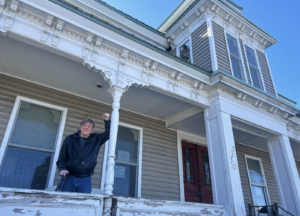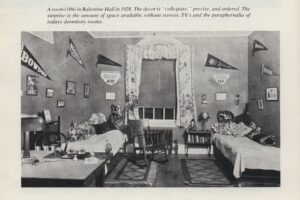
“If this lede was a movie, and the opening scene is tracking … where is that camera going?” Jim Sheeler posed to a classroom full of journalism students, each hanging onto his every word.
Sheeler is the winner of the 2006 Pulitzer Prize in Feature Writing for “Final Salute,” a 12,000-word story about fallen soldiers and the families they leave behind. Janet Maslin of The New York Times praised “Final Salute” in 2008, saying the story was “One of the great underreported stories of the Iraq war.” Sheeler is currently a professor at Case Western Reserve University in Cleveland, Ohio.
Imagine the students’ excitement when such a writer sat in their classroom in Orono, Maine, answered their questions and bestowed wisdom.
Sheeler is one of three Pulitzer Prize-winning journalists who visited the University of Maine this past week. Sheeler was joined by Amy Ellis Nutt of the Washington Post and Kathleen Kingsbury of the Boston Globe.
Kingsbury was the 2015 recipient of the Pulitzer Prize in Editorial Writing for her expose of the seemingly corrupt restaurant industry called “Service Not Included.” In her series, she highlighted the true cost of inexpensive menu items, as well as wage inequality. She is now the Ideas Editor for the Boston Globe.
Nutt was the 2011 recipient of the Pulitzer Prize in Feature Writing for her story about the mysterious sinking of a fishing boat that killed six men, called “The Wreck of the Lady Mary.” Nutt is now a writer on the brain beat for the Washington Post.
Nutt recently released her third book, “Becoming Nicole: The Transformation of an American Family” in 2015, which follows transgender teen Nicole Maines and her family through Maines’ life. Maines is currently a student at UMaine, and has facilitated many lectures in the last few months following the release of “Becoming Nicole.”
“Pulitzer Week,” as it is called at UMaine, was part of a centennial celebration of the Pulitzer Prize itself. In addition to facilitating class discussions, the visiting writers ate lunch with students and gave presentations in the Wells Conference Center and at the Bangor Public Library.
According to the UMaine website, a grant from the Maine Humanities Council, support from the UMaine Humanities Center and the UMaine Department of Communication and Journalism’s Alan Miller Fund for Excellence in Communication and Journalism made Pulitzer Week possible. The Alan Miller Fund for Excellence in Communication and Journalism has helped to bring journalists to campus for similar visits since 2007. Among them is Bettina Boxall, recipient of the 2009 Pulitzer Prize in Exploratory Reporting and a UMaine alumna (Class of 1974).
“Organizers say the event offers an unprecedented opportunity to bring multiple Pulitzer Prize-winning journalists to the Bangor-Orono area to participate in public forums, educate students and engage residents on topics of public interest while impressing upon the community the essential civic role of quality journalism,” the UMaine News blog stated.
Beth Staples, adjunct professor and news writer for the Division of Marketing and Communications at UMaine, has a similar opinion.
“I think it helps students see what’s possible. We’ve had three incredible journalists and three incredible people who are passionate about what they do,” Staples said. “I just think that gives students something to shoot for if they’re interested in pursuing journalism.”
Staples’ Feature Writing class, CMJ 435, was one of few that was visited by all three journalists.
For students, Sheeler, Kingsbury and Nutt each had unique, but valuable, advice. At any of the given Pulitzer Week events, students and community members could be found with notebooks and laptops, scribbling and typing notes at the speed of light.
Sheeler encouraged young journalists to always carry a notebook with them, and to never leave the scene of an event or interview without an idea in their head of how that story will look. Kingsbury offered the three questions she always asks herself before she writes each piece. Among Kingsbury’s questions were, “Why do this story now?” Nutt told students to be voracious readers in all genres, and to have “a sense of wonder about the world.” All three writers mentioned the importance of having some sort of online presence as a journalist, including Twitter.
For Kingsbury, these talks mean even more than inspiring students.
“I actually never ever leave events like this without two or three story ideas,” Kingsbury said.
At other colleges and universities where Kingsbury has spoken, students have actually pitched story ideas that were later assigned and published.
“I do it, also, because diversity in our newsroom is really important … meaning both racial diversity but also socio-economic diversity, making sure that people feel like they can get a foot in the door, and that they can bring their backgrounds and their own opinions but also, you know, their skill set to our newsroom … I like to just meet a lot of people,” Kingsbury said.
Sheeler gives public talks similar to those during Pulitzer Week five or six times a year.
“I just hope that students realize that these stories do resonate,” Sheeler said in a telephone interview. “They [stories waiting to be told] will always be there. We will always need people to tell these stories … people have always been driven to listen to stories, and we need people to tell them. I was in the same spot that they [aspiring journalists] were … 30 years ago. As long as you have the drive and the caring and the ability to listen, than you can do this too.”
After their presentations, each journalist encouraged students to email them with any further questions. Kingsbury even said she’d be happy to receive story pitches.
Nutt ended one of her talks by explaining why she loves being a journalist.
“When you’ve opened up someone’s eyes [with the story you wrote] … you can’t help but be changed by the people you meet and the stories you tell,” Nutt said. “You’ll be a richer person for it.”
For more information on “Final Salute,” “Service Not Included” or “The Wreck of the Lady Mary,” or to read the stories in full, visit www.pulitzer.org.
Alan Bennett contributed to this report.








